Ramadan in Dubai: Insights and Events for 2024
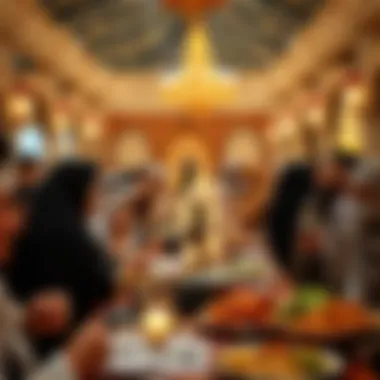
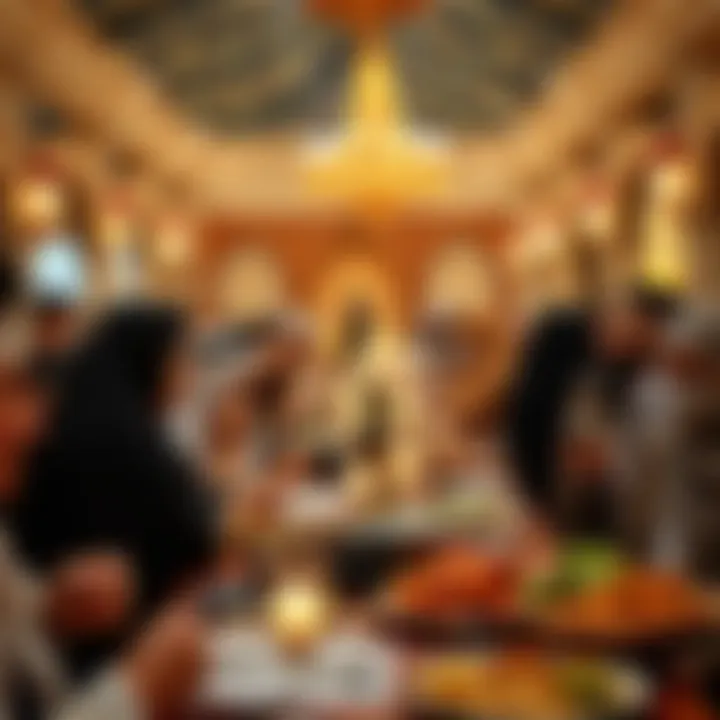
Intro
In the shimmering heart of the Middle East, Dubai stands as a unique juxtaposition of tradition and modernity, particularly during the sacred month of Ramadan. With its rich tapestry of cultures and communities, this period not only holds profound spiritual significance but also shapes the social and economic landscape of the city. For the year 2024, Ramadan promises to be an experience unlike any other, and it has much to offer for residents and visitors alike, including potential opportunities for investors and homebuyers.
As the sun dips below the horizon, Dubai transforms. Bustling streets become alive with the aromas of traditional Iftar meals, while mosques echo with prayers that resonate far beyond their walls. This overview aims to delve into the various facets of Ramadan in 2024, shedding light on the cultural richness, the community spirit, and the underlying implications for the real estate sector during this holy month.
Investors, homebuyers, and lifestyle enthusiasts will find significant value in understanding how Ramadan influences property dynamics in one of the world’s most vibrant real estate markets. Over the next sections, we will explore market insights and investment strategies that underscore the essence of Ramadan in Dubai.
Understanding Ramadan: The Basics
Grasping the essence of Ramadan is not merely an academic endeavor; it’s a gateway into understanding the rich tapestry of cultural and social dynamics that shape communities, especially in vibrant locales like Dubai. This holy month is a time for reflection, spiritual growth, and community bonding.
Definition and Significance
Ramadan is the ninth month of the Islamic lunar calendar, observed by Muslims worldwide as a month of fasting, prayer, and reflection. The significance of Ramadan stems from its role as a time for believers to cultivate a deeper connection with their faith through acts of worship, self-discipline, and community engagement.
Additionally, Ramadan marks the occasion when the Quran, the holy book of Islam, was first revealed to the Prophet Muhammad. In Dubai, the atmosphere during this month transforms dramatically, as people come together to support one another and partake in communal meals, especially during Iftar—the evening meal that breaks the daily fast.
"Ramadan is not just a month of fasting; it's a school where self-control and compassion are cultivated."
Cultural Practices During Ramadan
In Dubai, as in many parts of the world, cultural practices during Ramadan are abundant and multifaceted. As the sun sets each day, the local call to prayer invites families and friends to gather for Iftar, which often includes a spread of traditional dishes. Dates and water are typically the first items consumed to break the fast, following an age-old tradition.
Moreover, the community spirit shines brightly during Ramadan. You’ll find streets adorned with lanterns and decorations, while local establishments often extend their hours to cater to those partaking in late-night meals. Many opt to volunteer in community initiatives, providing meals for those in need, emphasizing the month’s focus on charity and generosity.
- Local hotels and restaurants often offer lavish buffet spreads for Iftar.
- Cultural events, such as storytelling and poetry readings, enrich the experience, showcasing the region's literary heritage.
- Art exhibitions and workshops host programs that revolve around themes of unity and harmony.
How Ramadan is Observed Globally
Globally, the observance of Ramadan shares many similarities but also exhibits regional distinctiveness. In countries like Saudi Arabia, communal prayers called Taraweeh are performed in mosques every night during the month, a practice echoed throughout the Gulf region, including Dubai.
In contrast, places like Indonesia and Turkey offer unique twists; for instance, the breaking of the fast might include dishes specific to local palates. The spirit of Ramadan is universal, yet the customs vary. It reminds us that while practices may change, the core values of compassion, patience, and community remain steadfast.
This month also brings about an economic upturn in various regions due to increased consumer spending in hospitality and retail sectors, highlighting how Ramadan in any place can have both spiritual and practical implications.
- Iftar traditions vary:
- Middle Eastern countries might indulge in rich, communal platters.
- Southeast Asian nations favor lighter, sweeter desserts for breaking the fast.
As one navigates this sacred time, acknowledging both local and global contexts enriches the overall understanding of Ramadan and its impact on communities.
Ramadan in Dubai: A Unique Perspective
Beyond the fast, the essence of Ramadan in Dubai embodies a cultural tapestry woven across time. This month serves as a profound reminder of community values, spirituality, and collective benevolence. Various traditions uphold the significance of Ramadan, shedding light on how its celebration transcends mere rituals, influencing daily life and the economic fabric of the city. Investors, homebuyers, and property managers alike should take note: understanding Ramadan’s local impacts adds a nuanced dimension to any engagement with the Dubai real estate landscape.
Historical Context of Ramadan in Dubai
To truly appreciate Ramadan in the present day, one needs to take a step back and consider its historical roots in Dubai. The cornerstones of Islamic faith established centuries ago remain potent today. After the formation of the United Arab Emirates in 1971, the blending of tradition and modernization laid fertile ground for Ramadan to thrive in the urban milieu.
During the early years, the observance of Ramadan here was often marked with simplicity, primarily driven by the local populace. Residents gathered to break their fast collectively, relying on modest provisions. Today, striking a contrast, newly constructed luxury hotels and dining venues offer grand iftar buffets, presenting a blend of culinary richness inspired by local and international cuisines. This shift signifies not just an evolution in lifestyle but also mirrors the growth of Dubai as a global metropolis.
Cultural Relevance Over the Years
Throughout the decades, these Ramadan customs have remained steadfast even as Dubai morphs into an icon of modernity. For instance, the call to prayer resonates through the city, echoing the timeless traditions that connect the vast tapestry of Dubai’s multi-ethnic populace.
Locally Celebrated Traditions
What makes Ramadan in Dubai uniquely special is its ability to fuse traditional practices with contemporary flair. Locals, regardless of their background, participate in customs that echo the spirit of unity and charity.
Iftar Gatherings
The breaking of the fast at sunset, known as iftar, tells volumes about Dubai's communal spirit. Families often host large gatherings, inviting friends and neighbors to partake in feast-like dinners. Restaurants, too, embrace this tradition, crafting special menus that are often creatively themed, providing various local delicacies such as dates, lamb dishes, and refreshing mint lemonade.
- The Culinary Scene: Some of the must-try dishes during this month include Shawarma, a popular choice to be enjoyed during iftar, and various variants of Harees, known for its rich texture.
- Charity and Giving: Ramadan is also synonymous with giving. Numerous charity initiatives, like providing meals for the needy, are common. Locals volunteer their time and resources, nurturing a sense of compassion throughout the community.


Night Markets and Cultural Events
As the sun sets, the atmosphere in Dubai transforms. Night markets spring to life, laden with cultural exhibitions, art displays, and food stalls that reflect both modern innovation and deep-rooted traditions. Places like Al Seef and Global Village become cultural hubs where families can experience not just local but global traditions through food and entertainment.
These intricate embellishments of tradition make Ramadan not only a spiritual journey but also an opportunity for economic engagement, especially in the retail and service sectors. Hospitality and tourism thrive during this month as international visitors are drawn to partake in the unique festivities, further prompting opportunities for those in real estate and investment sectors.
Understanding these local celebrations sets the stage for more meaningful interactions in the marketplace, painting a vibrant picture of Dubai's living culture during Ramadan.
As Dubai's community embraces the spirit of Ramadan, both for its spiritual significance and economic potential, the month unfurls layers of interaction and engagement that investors and property managers would do well to consider while navigating the local landscape.
Economic Implications of Ramadan
Understanding the economic implications of Ramadan in Dubai is not just about grasping a seasonal shift in consumer behavior; it's about recognizing the profound cultural ties this month has with the economy. This year, as we navigate through the nuances of Ramadan, businesses, investors, and residents alike will feel the pulse of economic activity that intensifies during this holy month. Ramadan shapes spending habits and influences business operations, directly impacting the local economy and real estate market.
Effects on Business Operations
During Ramadan, businesses tweak their operations to align with the observance of fasting from dawn till dusk. Retail stores, restaurants, and service providers often adjust their working hours, opening later in the day to cater to the influx of customers looking to break their fast. For instance, many eateries proudly display their iftar menus that tantalize the taste buds of those fasting, often turning into bustling hubs of activity as the call to prayer signals sunset.
Furthermore, promotional campaigns become a staple, showcasing discounts and special deals that entice buyers. Businesses leverage this opportunity to boost sales while fostering a sense of community. A savvy restaurant might offer combo deals during iftar, ensuring both locals and tourists are drawn in. With increased foot traffic in malls and markets, the retail sector sees a notable uptick in sales as families come together to shop for Ramadan essentials.
Essentially, Ramadan brings a temporary surge, and those businesses that can adapt quickly will reap the rewards. A noteworthy example is the delicious Arabic sweets like kunafa and qatayef that see a spike in demand. This adjustment isn't merely about sales figures; it's a chance for brands to engage with the community on a deeper level, aligning products with values and traditions that resonate during this month.
Investment Opportunities During Ramadan
For investors, Ramadan opens up unique avenues to explore, particularly in sectors linked to hospitality and retail. The rising tourism numbers during this month mean hotels and accommodations will be in high demand. Properties near popular iftar spots and community events often see heightened interest, translating into possible investment opportunities.
Moreover, events that celebrate culture and community, like night markets, also create a vibrant atmosphere that draws in crowds. Property managers should keep their eyes peeled for trends in areas that are hosting these events. With many residents and visitors looking for entertainment and social interactions, investing in properties that can host gatherings or activities could prove beneficial.
Thinking about the real estate market too, development projects that cater to the lifestyle preferences of the community can gain traction during this time. A collaboration with local businesses for pop-up markets or events can enhance the appeal and functionality of a space. Those in the know can identify which neighborhoods are gearing up for robust Ramadan celebrations and invest accordingly.
It’s crucial for keen investors to remember: what may seem like just increased foot traffic can actually be a barometer for future demand and economic health.
Real Estate Market Dynamics During Ramadan
The month of Ramadan holds profound implications for the real estate market in Dubai. Understanding these dynamics not only informs potential investors but also sheds light on the shifts in consumer behavior during this holy period. Ramadan serves as a unique time when cultural practices influence property demand, rental rates, and ultimately, real estate values. Each year, as the holy month approaches, the market anticipates shifts that can either enhance opportunities or present challenges, making this a critical period for decision-making.
Shifts in Property Demand
During Ramadan, there is often a noticeable shift in property demand, largely influenced by cultural and social practices that define the month. Families and individuals seek larger spaces, reflecting the communal spirit that comes alive at iftar gatherings. The tradition of sharing meals at sunset plays a significant role in this increased demand for larger homes or villas with spatial capacity to accommodate guests.
- Increased Demand for Villas and Apartments: Many families prefer villas or 3+ bedroom apartments during this time, allowing for family members or friends to join in the celebrations. The desire to host large gatherings shifts attention towards properties that boast open spaces or dedicated dining areas.
- Short-term Rentals: A growing trend is short-term rentals, particularly for expatriates and tourists who wish to experience Ramadan in Dubai. These properties become a focal point, as people seek accommodations that provide easy access to community events, mosques, and cultural festivities.
- Location Preferences: Properties near mosques or vibrant community centers typically see a surge in interest. The proximity to places of worship becomes a significant factor influencing buyer and renter decisions during Ramadan.
Rental Trends and Opportunities
With the influx of visitors and a rise in demand for rental properties, Ramadan introduces distinct opportunities within the rental market. Landlords and property managers often adjust their strategies to harness the potential of this festive season.
- Raising Rental Rates: As demand surges, property owners might consider elevating rental rates for the duration of Ramadan. This is particularly evident in premium locations where proximity to cultural events attracts numerous residents and tourists alike.
- Flexibility in Lease Terms: Many renters prefer shorter leases during Ramadan, impacting landlords to offer flexible rental terms. This can include monthly rentals or seasonal leases, catering to the ebb and flow of demand.
- Enhanced Amenities: Properties with added features such as outdoor dining areas, prayer rooms, or community spaces witness an uptick in demand. Investors who focus on these aspects may find enhanced interest and quicker turnover of their properties.
Impact on Property Values
The real estate landscape during Ramadan does not merely alter housing demands, but also bears implications for property values, shaping long-term trends that investors must consider carefully.
- Short-term Fluctuations: During the festive month, property values can experience temporary fluctuations. The increased demand and higher rental rates during this period can lead to a notable spike in property valuations, which may stabilize post-Ramadan.
- Long-term Value Considerations: Properties that demonstrate adaptability for community gathering or cultural celebrations may retain their value better than others. Investors looking for sustainable growth should consider the property’s potential for hosting Ramadan events when assessing long-term value.
- Market Resilience: Historically, the UAE real estate market shows resilience during Ramadan, and properties that are adaptable during this time often prove to be good investments.
"Understanding the real estate dynamics during Ramadan is essential for both investors and homebuyers. The fluctuations in demand and pricing offer unique open doors for strategic investments."
As the year 2024 unfolds, the interplay of local traditions, consumer preferences, and overall market behavior will continue to shape the property dynamics during Ramadan in Dubai. For savvy investors and property managers, harnessing these insights can pave the way for strategic planning and better investment outcomes.
Key Events and Activities in Dubai during Ramadan
Ramadan in Dubai is not simply about fasting; it is a vibrant tapestry of events and activities that enrich the community’s cultural experience. The month is marked by engagements that span spiritual reflection, social gatherings, and culinary delights. For investors and lifestyle enthusiasts, understanding these activities is critical as they provide insights into the broader impacts on community life and economic opportunities.
Iftar Gatherings and Social Events
During Ramadan, one of the most cherished traditions is the Iftar gathering, where families and friends come together to break their fast. The significance boils down to more than merely sharing a meal; it symbolizes unity, generosity, and community spirit. In Dubai, Iftar events range from intimate family affairs to large community banquets.
Restaurants across the city curate special Iftar menus, combining traditional dishes with modern culinary innovations. Popular spots like Al Fanar and Zaroob often feature multi-course buffets, highlighting local specialties such as Harees and Kibbeh.
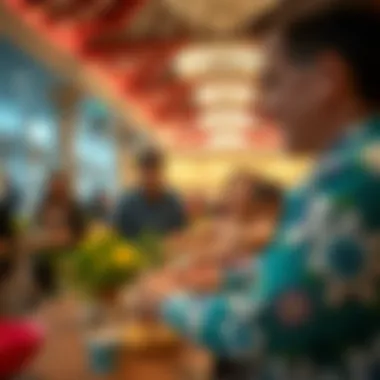
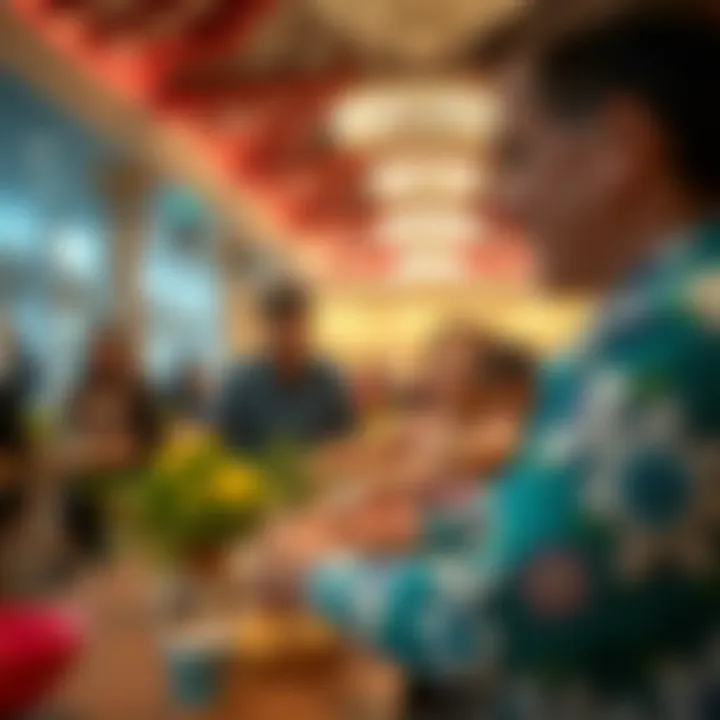
Additionally, many hotels, like the Burj Al Arab and Atlantis The Palm, host lavish Iftar events that not only satiate hunger but also provide entertainment, featuring live music and cultural performances. These events are not just feasts; they are opportunities to connect, network, and deepen social ties—a vital aspect for homebuyers and property managers looking to understand social dynamics in neighborhoods.
Highlights of Iftar Gatherings
- Cultural Significance: Represents sharing and community bond.
- Culinary Diversity: Varieties of dishes are presented, reflecting the cultural melting pot of Dubai.
- Networking Opportunities: These gatherings foster new relationships that can prove critical in business and investment.
Community Initiatives and Charity Drives
In alignment with the spirit of giving that Ramadan promotes, Dubai hosts numerous community initiatives and charity drives. These efforts help support the less fortunate and reinforce the social fabric of the community. Various organizations in the emirate, such as Dubai Cares and The Giving Tree, launch fundraising campaigns aimed at supporting education and healthcare.
Charitable events also take various forms, from fundraising dinners to volunteer activities. Events like Walk for Charity engage community members in raising awareness about key issues while promoting physical wellness.
It’s worth noting that during Ramadan, the economic dynamics shift significantly. Businesses involved in charity see increased patronage, as residents and visitors want to contribute to worthy causes, reflecting positively on brand perspective and community engagement.
Key Points on Community Initiatives
- Volunteerism: Residents often participate in volunteering efforts, building a sense of belonging.
- Charity Events: Fundraising brings the community together, strengthening social ties.
- Investment Opportunities: Businesses that align with charitable missions are often viewed favorably, presenting opportunities for investor engagement.
The spirit of Ramadan is not just about abstention; it's about re-engaging with the community and fostering relationships that can yield social dividends.
These communal experiences enhance the quality of life in Dubai during Ramadan. They serve as a testament to the resilience and unity within the diverse population, making for an enriching chapter in the lives of residents and visitors alike.
Healthcare and Wellness Considerations During Ramadan
Ramadan, a month revered by millions, demands significant adaptations in daily routines, especially regarding healthcare and wellness. The journey of fasting from dawn until sunset is not merely about abstaining from food and drink; it encompasses both physical and mental wellness. This section delves into the healthcare considerations that individuals should embrace during this holy month in Dubai, where the heat can be demanding and routines shift dramatically.
Dietary Adjustments for Well-being
Eating habits undergo a transformation during Ramadan, and this warrants careful planning to maintain health. Pre-dawn meals, known as suhoor, are crucial. Opting for nutrient-dense foods can help sustain energy levels throughout the day. Here are key dietary adjustments to consider:
- Hydration: Drink ample amounts of water during non-fasting hours. Aim for at least two liters from iftar until suhoor to counteract the dehydration that can occur.
- Balanced Nutrition: Focus on complex carbohydrates, healthy fats, and proteins. For example, incorporating items like whole grains, nuts, and lean meats into meals can be beneficial.
- Avoid Sugary Foods: While it may be tempting to indulge in sweets after breaking the fast, too much sugar can lead to crashes in energy levels. Instead, choose natural sweets like fresh fruits.
Making smart choices during iftar and suhoor can enhance energy levels and mood, thereby ensuring a more fulfilling Ramadan experience.
"It is not about how much you eat, but what you eat that counts during Ramadan."
Strategies for Maintaining Energy Levels
Maintaining energy during fasting hours is essential for productivity and well-being, especially in an environment as vibrant as Dubai. Several strategies can improve one’s ability to navigate this period while remaining energized:
- Frequent Light Meals: Breaking the fast with a light meal can provide essential nutrients without overwhelming the digestive system. Following up with a balanced meal can further help restore energy levels.
- Rest Periods: Allow your body to adjust by incorporating short rest periods during the day, particularly after iftar. Quality sleep during the night will help in recovery and overall wellness.
- Physical Activity: Engage in light exercise during cooler parts of the day, such as evening walks. This can boost mood and circulation without draining energy.
In the grand scheme, these strategies not only help in managing energy but also promote a healthier lifestyle during the Ramadan month.
By prioritizing dietary adjustments and energy-boosting practices, individuals can navigate the challenges of Ramadan with grace. This focus on health facilitates a more profound connection to the spiritual aspects of the month, allowing for reflection and community engagement.
The Role of Technology in Ramadan
As the world grows increasingly digital, the significance of technology during Ramadan takes on a special relevance. Especially in a cosmopolitan hub like Dubai, technology plays a pivotal role in enhancing the experiences of those observing Ramadan. The fusion of tradition with modernity is an essential element, as residents and visitors alike seek ways to engage with the holy month through various digital platforms and tools. This section will explore a few key aspects related to the impact of technology during Ramadan 2024.
Digital Engagement in Festivities
Ramadan in Dubai is often characterized by vibrant community festivities, and technology has made participation easier than ever. Social media platforms are abuzz with posts and messages related to the holy month, turning digital engagement into a key component of Ramadan celebrations.
- Social Media Interaction: Community members share iftar gatherings, charitable initiatives, and personal reflections, allowing for a shared experience that transcends geographical boundaries. An active presence on platforms like Facebook and Instagram enables families and friends to connect and stay updated on Ramadan events and community needs.
- Online Events: Many mosques and organizations leverage streaming services to host virtual lectures, Quran readings, and educational workshops. This means that even those unable to attend in person can partake in these spiritual sessions, ensuring that the essence of Ramadan is accessible to all.
"In the past, we relied on word of mouth to stay connected during Ramadan. Today, my WhatsApp groups help keep me posted about local events and charity drives in real-time," shares a local resident.
Utilizing Apps for Ramadan Scheduling
Mobile applications have emerged as invaluable tools for individuals trying to navigate their schedules during Ramadan. With fasting periods and prayer times significantly affecting daily routines, dedicated apps can greatly assist in planning for the month.
- Iftar and Suhoor Timings: Apps like Muslim Pro and Ramadan Legacy provide precise prayer times, making it easier to plan meals around fasting hours. This ensures that users can break their fast right on time, reflecting the importance of communal iftar dinners.
- Event Discovery: Certain apps help users discover local Ramadan offerings, from food pop-ups to cultural events. For instance, an app might highlight family-friendly iftar locations around Dubai or list local bazaars where attendees can purchase traditional snacks and items.
- Goal Tracking: Many individuals use technology to set personal goals for prayer and charitable giving during Ramadan. Apps can help track Quran progress or donation commitments, leading to a fulfilling month not just through traditional observances but also through personal achievements.
In summary, technology adds a layer of convenience and connection to Ramadan 2024 in Dubai. It transforms fasting from a solitary endeavor into a community-oriented experience, while apps help streamline daily activities in a busy world. By embracing these digital advancements, the essence of Ramadan can thrive even in the fast-paced environments the modern world presents.
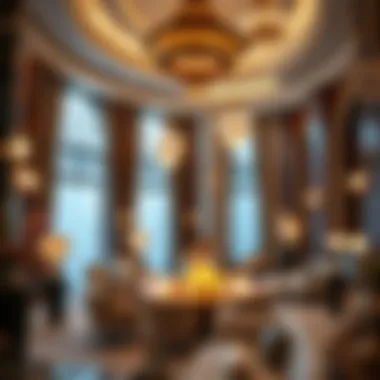
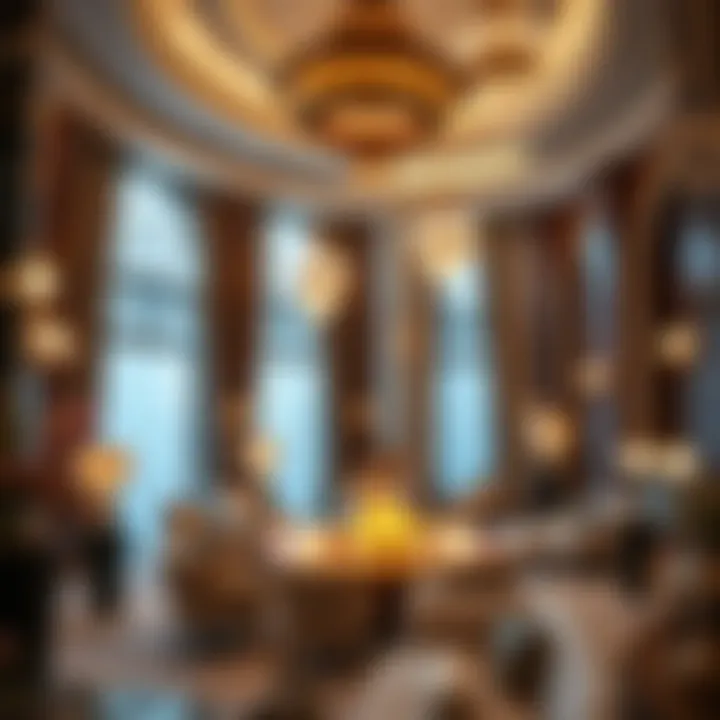
Impacts on Social Behavior During Ramadan
Ramadan is not just a month of fasting; it is a profound period that brings about notable shifts in social behavior in Dubai. This transformation is entwined with customs, community ties, and the ethos of collectivism that are central to Islamic culture. Understanding how these changes play out socially is crucial, especially for investors, homebuyers, and property managers, as it profoundly influences the community's landscape.
Shifts in Public Interaction
During Ramadan, public interactions undergo a significant change. People become more empathetic and kind-hearted during this holy month, nurturing a sense of unity. Conversations shift from casual to more meaningful ones, with individuals engaging in dialogues that linger on spirituality and self-reflection.
For instance, you may spot strangers bonding over shared iftar meals in parks, or families inviting non-Muslim friends to join in for sunset prayers and meals. This level of openness cultivates an environment where respect and understanding flourish.
Key Accompanying Changes:
- Increased instances of friendly greetings and well-wishes, promoting a more congenial public atmosphere.
- Fostering multicultural understanding, particularly in diverse settings like Dubai, where different cultures converge.
Hotels, malls, and restaurants often also adapt their marketing strategies to align with this communal spirit, offering special evening events that invite all communities, thereby encouraging social engagement beyond religious boundaries. This period becomes ripe for community-building and networking among neighborhoods, which also has implications for local businesses seeking to attract a wider audience.
Community Cohesion and Support
The essence of Ramadan hinges on charitable acts and communal solidarity. In Dubai, this month is marked by numerous initiatives aimed at uplifting less fortunate members of society, thus reinforcing the bonds within the community. Charity drives, iftar events open to all, and fundraising for various causes are commonplace, creating an atmosphere that champions togetherness.
Many organizations collaborate with local charities, encouraging corporate social responsibility that not only revitalizes communities but also offers a glimpse into the heart of Dubai's culture. The spirit of giving permeates every facet of daily life, enhancing local cohabitation.
"In the month of Ramadan, the act of giving bridges differences and cultivates a supportive community spirit, irrespective of background."
These community-oriented efforts translate to long-term social impacts. As empathy grows, relationships deepen, and many residents feel a profound sense of belonging. Consequently, individuals and families might be more inclined to explore long-term rentals in neighborhoods that exhibit strong community ties during Ramadan.
Considerations for Investors:
- Understanding the social climate can help property managers anticipate changes in rental desires.
- Increased popularity of neighborhoods known for strong communal events might influence property values post-Ramadan.
Culinary Experiences Unique to Ramadan
Ramadan in Dubai isn’t just about fasting and prayers; it’s also a celebration of culinary delights that bring families and communities together. The significance of food during this month goes way beyond just eating. It’s about tradition, culture, and the joy of sharing meals with loved ones. The flavors of Ramadan transform the dining culture in Dubai, giving it a unique flair that is hard to miss.
Because the act of breaking the fast is so significant, knowing what’s on the table often becomes a key focus for many. Iftar, the evening meal that marks the end of the daily fast, turns into a sumptuous spread that offers a blend of traditional dishes and modern twists. This section delves into some of the traditional dishes that adorn tables during Ramadan and explores emerging trends that make dining experiences even more exciting.
Traditional Dishes and Their Origins
When you think about Ramadan in Dubai, classic dishes spring to mind. These aren’t just meals; they are rich with history and meaning.
- Dates: Breaking fast with dates is a custom that dates back to the time of Prophet Muhammad. They provide quick energy, making them a preferred choice for many.
- Harees: A hearty dish made from wheat and meat, harees combines flavor and nutrition. Its origins can be traced back to the Arabian Peninsula and it has been a staple during Ramadan for generations.
- Samboosas: These little pockets of joy, often filled with spiced potatoes or meat, are loved across the Middle East. The crispy texture and delightful fillings make them a highlight during iftar.
- Shorbat Adas:
A lentil soup that warms the heart and soul, packed with nutrition. It’s a perfect starter that is both filling and nourishing, especially after a day of fasting.
"Food is symbolic of love when words are inadequate."
These traditional dishes don’t merely feed the body; they embody the spirit of sharing and giving that Ramadan is all about. Each bite carries a story, enhanced by the way families come together to prepare and enjoy them.
Emerging Food Trends During Ramadan
This year sees an exciting evolution in dietary habits during Ramadan, as food trends reflect a mix of heritage and innovation.
- Health-focused Menus: As more people become health-conscious, restaurants and cafes are offering menus that include low-calorie dishes and organic ingredients. Foods rich in fiber and protein are being highlighted.
- Vegan and Plant-based options:
Many establishments are introducing vegan iftar options, expanding the cultural experience beyond traditional meat dishes. From falafels to plant-based biryanis, the options are plentiful. - Fusion Cuisine: Culinary experts in Dubai are experimenting with flavors, blending Middle Eastern traditions with Asian or Mediterranean influences. You might find biryani infused with Italian herbs or Greek-style kofta.
- Gourmet Iftar Buffets:
High-end restaurants are upping their game with extravagant buffets that offer a lavish spread. Think sushi rolling stations alongside traditional lamb dishes.
The culinary experiences during Ramadan in Dubai reflect a blend of respect for tradition while embracing modern trends that cater to a diverse palate. These practices not only elevate the dining experience but also foster community spirit, making every iftar gathering special.
In sum, the food of Ramadan serves as a bridge connecting the past with the present, ensuring that every savory morsel is savored not just for its taste, but for its power to gather and unite.
Post-Ramadan Reflections on Trends and Changes
As Ramadan draws to a close, the aftermath of this spiritually enriching month in Dubai presents an opportunity to reflect on various trends and changes that have emerged. It’s not just about the fasting or abstaining from daily indulgences; it's about how this period molds the very fabric of society, economic behavior, and lifestyle choices. Understanding these trends is crucial for investors and homebuyers since they can significantly influence market dynamics in the months to come.
"After Ramadan, the real estate landscape often shifts in ways that can provide rich insights for potential investors."
Long-term Effects on Real Estate
The conclusion of Ramadan often tempts many to rethink their living arrangements or investment strategies. During Ramadan, there’s noticeable slow down in activities, but as people return to routine, the real estate market tends to rev up. A few key long-term effects can be observed:
- Increased Demand for Family-oriented Properties: Many families look to establish stable homes during Ramadan. The collective vision of community and family bonding during Iftar often drives the desire for larger properties closer to amenities.
- Investment in Commercial Spaces: Businesses reopen with vigor post-Ramadan. Owners tend to invest more in commercial real estate, setting the stage for high and sustained demand in retail spaces, especially those aligned with cafe and restaurant culture.
- Rental Market Fluctuations: Post-Ramadan, rental prices can see a spike, fueled by companies relocating employees who previously opted for short-term leases during the month. This trend likely encourages property injuries to look at the benefits of long-term rentals for consistent returns.
Cultural Shifts and Their Repercussions
Ramadan is more than a religious observance; it acts as a cultural catalyst that brings significant shifts in social behavior. The culmination of these cultural changes often impacts broader society even after Ramadan ends. Key areas of focus include:
- Rekindled Community Bonds: The emphasis on community charity and togetherness often leads to stronger neighborhood ties, enduring well after the fasting month. This is crucial for investors who understand that community cohesion can elevate property desirability.
- Patterns in Consumer Behavior: Post-Ramadan typically sees a persistent trend toward healthier eating habits adopted during the month. People may maintain preferences for organic produce and dining establishments focusing on healthier choices, which can influence the local market for food and hospitality.
- Innovations in Traditional Practices: As traditional Ramadan practices give rise to new ideas in hospitality and family gatherings, this may affect how businesses approach marketing and service offerings. Notably, there’s a shift towards more immersive dining experiences that cater to diverse tastes, reflecting a modernized approach to cultural traditions.













